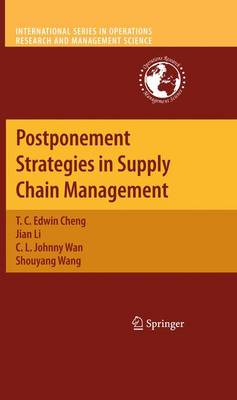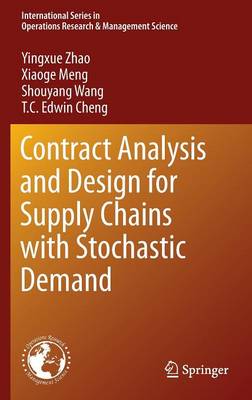International Series in Operations Research & Management Science
4 primary works
Book 107
Foreign-Exchange-Rate Forecasting with Artificial Neural Networks
by Lean Yu, Shouyang Wang, and Kin Keung Lai
This book focuses on forecasting foreign exchange rates via artificial neural networks (ANNs), creating and applying the highly useful computational techniques of Artificial Neural Networks (ANNs) to foreign-exchange rate forecasting. The result is an up-to-date review of the most recent research developments in forecasting foreign exchange rates coupled with a highly useful methodological approach to predicting rate changes in foreign currency exchanges.
Book 143
Postponement Strategies in Supply Chain Management
by T.C. Edwin Cheng, Jian Li, C. L. Johnny Wan, and Shouyang Wang
Book 165
Risk Management of Supply and Cash Flows in Supply Chains
by Jian Li, Jia Chen, and Shouyang Wang
Risk management has become an essential issue in supply chain management, from the modeling of the decision maker's risk preference, and the studies on uncertain elements such as demand, supply, price, lead time, etc., to the consideration of more practical background including cash flow constraints, inventory financing and delayed cash payment. In this new volume, the authors provide a framework to study the interaction of various factors related to risk and their influence on supply chain management.
The scope of areas covered includes operations management, decision analysis, and business administration. This book focuses on several key issues of risk management in supply chains. Specifically, an analysis framework is presented for studying the supplier selection problem and identifying the optimal sourcing strategy in a one-retailer two-suppliers supply chain with random yields. The optimal sourcing strategy of a retailer and the pricing strategies of two suppliers under an environment of supply disruption are investigated. Besides, the authors study the dynamic inventory control problems with cash flow constraints, financing decisions as well as delayed cash payment. In addition, originating from the annual international iron ore price negotiation, the authors model the bargaining process to deal with the risk of wholesale price in the game analysis context.
Within the three perspectives of risk management in supply chains, the modeling of decision maker's risk preference has been extensively studied and many results have been obtained to guide the practice. However, the analysis on the other two kinds of topics is still in its infancy, and needs more efforts from academia. It is thus the ambition and innovation for this book to contribute on risk management in supply chains in the following ways:
(1) characterizing the explicit sourcing strategy (i.e., single sourcing or dual sourcing) to deal with supply disruption risk;
(2)introducing the concepts of financial risk measurement by incorporating cash flow constraints, inventory financing and delayed cash payment into inventory management models; and
(3) providing insights for the iron ore price negotiation to help steel manufacturers handle the risk of price increase.
Book 234
Contract Analysis and Design for Supply Chains with Stochastic Demand
by Yingxue Zhao, Xiaoge Meng, Shouyang Wang, and T.C. Edwin Cheng
This book is devoted to analysis and design of supply chain contracts with stochastic demand. Given the extensive utilization of contracts in supply chains, the issues concerning contract analysis and design are extremely important for supply chain management (SCM), and substantial research has been developed to address those issues over the past years. Despite the abundance of classical research, new research needs to be conducted in response to new issues emerging with the recent changing business environments, such as the fast-shortening life cycle of product and the increasing globalization of supply chains. This book addresses these issues, with the intention to present new research on how to apply contracts to improve SCM.
Contract Analysis and Design for Supply Chains with Stochastic Demand contains eight chapters and each chapter is summarized as follows: Chapter 1 provides a comprehensive review of the classical development of supply chain contracts. Chapter 2 examines the effects of demand uncertainty on the applicability of buyback contracts. Chapter 3 conducts a mean-risk analysis for wholesale price contracts, taking into account contracting value risk and risk preferences. Chapter 4 studies the optimization of product service system by franchise fee contracts in the service-oriented manufacturing supply chain with demand information asymmetry. Chapter 5 develops a bidirectional option contract model and explores the optimal contracting decisions and supply chain coordination issue with the bidirectional option. Chapter 6 addresses supply chain options pricing issue and a value-based pricing scheme is developed for the supply chain options. With a cooperative game theory approach, Chapter 7 explores the issues concerning supply chain contract selection/implementation with the option contract under consideration. Chapter 8 concludes the book and suggests worthy directions for future research.



